In re Local TV Adver. Antitrust Litig.
In re Local TV Adver. Antitrust Litig.
2024 WL 1956255 (N.D. Ill. 2024)
April 16, 2024
Kendall, Virginia M., United States District Judge
Summary
The special master found that Nexstar Media Group improperly withheld 95% of the 185 documents in question, claiming attorney-client privilege. The majority of these documents were compliance documents that did not contain requests for legal advice or reveal client confidences. The special master also found that Nexstar failed to establish their claims of protection under the work product doctrine.
Additional Decisions
IN RE: LOCAL TV ADVERTISING ANTITRUST LITIGATION
This document applies to all actions
This document applies to all actions
Master Docket No. 18-06785 | MDL No. 2867
United States District Court, N.D. Illinois, Eastern Division
Filed April 16, 2024
Kendall, Virginia M., United States District Judge
Special Master Report & Recommendation No. 2 Plaintiffs’ Motion to Compel No. 9 Seeking Production of Nexstar's Compliance Documents
Table of Contents
Introduction
Summary of the Special Master's Findings and Recommendations
Background
Procedural History Regarding Documents Now in Issue
Applicable Law
A. Business Compliance DocumentsB. Corporate PoliciesC. Broadcasters’ Political Advertising Disclosure StatementsD. Documents from Third PartiesE. Miscellaneous Documents
Conclusion
Introduction
Before the Special Master are 185 documents, which Nexstar Media Group withheld claiming attorney-client privilege.[1] Plaintiffs challenge the merits of Nexstar's privilege claims for “additional antitrust and business compliance documents” that were “drafted to assist employees in complying with competition and other laws in the performance of their marketing, sales, and other business responsibilities.”[2] These documents will be referred to as “business compliance” documents given that only one now-disputed document concerns antitrust. The majority concern compliance with the laws regarding broadcast of political advertisements.[3] Plaintiffs seek production of these documents.
This Report & Recommendation No. 2 (“R&R No. 2”) essentially is an addendum to Report & Recommendation No. 1 (“R&R No. 1”). See In re Local TV Advert. Antitrust Litig., No. 18-06785, 2023 WL 5956851 (N.D. Ill. July 28, 2023) (Levie, Special Master), aff'd In re Local TV Advert. Antitrust Litig., No. 18 C 6785, 2024 WL 165207 (N.D. Ill. Jan. 16, 2024) (Kendall, J).
Summary of the Special Master's Findings and Recommendations
Of the 185 Nexstar documents now at issue, the Special Master finds a privileged attorney-client communication in ten documents, which communications he recommends be redacted after which the document should be produced. As to Nexstar's three claims of protection under the work product doctrine, he finds Nexstar failed to carry its burden to establish those claims. In summary, the Special Master finds that Nexstar improperly withheld approximately 95% of the antitrust and business compliance documents that Plaintiffs challenged in their Motions to Compel No. 5 (ECF 688) and No. 9 (ECF 727).[4] The Special Master recommends that 10 Nexstar documents be withheld in whole or part based upon the invocation of the attorney-client privilege.
*2 The Special Master notes that these privilege findings and recommendations were not close calls. The Special Master had hoped that Nexstar, upon reading R&R No. 1 and the Court's Memorandum Opinion, would have conducted a more thorough self-review, resulting a more significant reduction in the number of documents remaining at issue.
Background
The facts of this case are set forth in detail in In re Local TV Advert. Antitrust Litig., No. 18-cv-6785, 2020 WL 6557665 (N.D. Ill. Nov. 6, 2020) and in In re Local TV Advert. Antitrust Litig., No. 18-cv-6785, 2022 WL 3716202 (N.D. Ill. Aug. 29, 2022).
The procedural history of the parties’ privilege disputes is detailed in the Special Master's R&R No. 1, see Local TV Advert., 2023 WL 5956851, at *3-6.
The law of this case is set forth in this Court's Memorandum Opinion & Order of January 16, 2024, Local TV Advert., 2024 WL 165207, which “accepted in full” the Special Master's Report & Recommendation No. 1, Local TV Advert., 2023 WL 5956851. Saliant to R&R No. 2, the Court expressly denied Defendants’ expansive interpretation of privileged “legal advice,” ruling that “statement by lawyers to clients must be tethered to or rest on client confidences in some way.”[5] The Special Master here incorporates and relies on the earlier interpretation of law, findings of fact, and recommendations as stated in R&R No. 1 and accepted by the Court.
Procedural History Regarding Documents Now in Issue
When it appeared that Nexstar was not reviewing its withheld documents in light of R&R No. 1 and the Court's Memorandum Opinion, the Special Master wrote Nexstar, on February 12, 2024:
Given that Judge Kendall has now affirmed RR1, including the recommendation that Nexstar produce all of its 124 antitrust documents withheld as privilege, the most expeditious path forward seems to be for Nexstar to re-review its outstanding 360+ documents in light of RR1.
Be advised that in reviewing those outstanding Nexstar documents I am finding significant overlap with the 124 antitrust documents addressed in RR1.[6]
Nexstar responded the next day. It stated that it had reviewed all the documents and could “confirm that none are duplicates of the documents in R&R No. 1 ... and [that all of] these documents are protected from disclosure by the applicable privilege(s) indicated on Nexstar's privilege log, and Nexstar does not waive the privilege.”[7] Nexstar also stated that its review revealed that in camera review of many of these documents would not be “sufficient to fully assess the privilege claims in this category.” Nexstar asserted that review of the parent emails was necessary.[8] Nexstar proposed to confer with Plaintiffs about this submission.[9] Plaintiffs and Nexstar conferred over the course of two weeks, with Plaintiffs providing an update midway stating the parties were “crystalizing the specific legal and factual issues involve.”[10]
On March 4, 2024, Nexstar apprised the Special Master that “[i]n response to your February 12 request, Nexstar has re-reviewed the unique documents on its privilege log in the “Corporate Policies” category and is withdrawing its claim of privilege over some of those documents.”[11]
*3 On March 6, 2024, Nexstar submitted to the Special Master a two-binder set of documents, containing 185 disputed compliance documents and 49 parent emails. The two-binders contained a new tab numbering system. The Special Master, who had already reviewed and organized the 360+ documents into categories, asked Nexstar to create an index to cross reference the tabs associated with the 360+ documents contained in the original four-binders to the new tab numbering in the two-binder set. Nexstar did so on March 8, 2024 and this was helpful in the additional review.
Applicable Law
Although R&R No. 1 laid out the Special Master's understanding of Seventh Circuit law on privilege, the Court noted the “confusion on when the privilege applies to lawyers’ statements to clients.”[12] With respect to compliance documents involving a lawyer's statement to clients where the subject of that statement is the law, the Court noted that compliance materials are such that one “tread[s] in an area of privilege law that is generally recognized to be especially difficult, namely, distinguishing ... legal advice from ... business advice.”[13] The Court ruled that “client confidences” is the key.[14] In contrast, lawyers’ statements that are “neutral objective analyses’ of the law or articulation(s) of policy’ are not privileged.”[15] Also not privileged are statements about “public information such as legislation, regulations, or summaries of the law made in ‘an objective, neutral manner.’ ”[16] In so holding the Court rejected Defendants’ expansive interpretation that “legal advice standing alone is privileged.”[17]
The Court posited another issue relating to compliance documents - if a lawyer communicates with its client, can one assume the client requested legal advice? The Court held in the negative; the request for legal advice can not be established by inference.[18] The Court held that the “asserting party has the burden to provide that facts and the context to tether the privilege claim.”[19]
In short, the Court held that the existence of privilege depends on “whether the lawyer's statements reveal client confidences or reveal that legal advice was sought and obtained.”[20]
Special Master's Review Process
The Special Master bases the findings and recommendations in R&R No. 2 on the Court's Memorandum Opinion and Order of January 16, 2024,[21] R&R No. 1, including the materials as he relied on in R&R No. 1, briefs and exhibits submitted by the parties and the Special Master's in camera review of the documents at issue.[22]
*4 Of the 185 documents Plaintiffs challenge, 181 are attachments and four are emails. Nexstar's privilege log indicates nine of these documents are redacted, yet the Special Master cannot determine which portions were redacted. Nexstar provided 49 parent emails for the documents at issue. The parent emails do not appear in the chart below as Plaintiff does not challenge them as improperly withheld compliance documents.
As the Special Master reviewed the documents and the corresponding privilege log entries, he found Nexstar's documents fell into several categories and grouped them accordingly:
A. Business Compliance DocumentsB. Corporate PoliciesC. Broadcasters’ Political Advertising Disclosure StatementsD. Documents from Third PartiesE. Miscellaneous Documents
The Special Master reviewed each document, its corresponding privilege log entry as well as any parent emails that Nexstar submitted to him. He then made findings of fact and recommendations. To the extent that the findings and recommendations were identical for multiple documents, the Special Master identified the individual documents and set forth the findings and recommendations once and cross-referenced later documents.
The Special Master's findings and recommendations as to each document appear in the Charts A-E below. The charts contain four columns, which are a condensed version of Nexstar's privilege log. Counsel for Nexstar, at the request of the Special Master, formatted the charts and inserted the content in the first three columns. The content is taken directly from Nexstar's privilege log, although the columns contain content combined from multiple columns in the privilege log. The Special Master drafted the contents of the last column—titled “Special Master's Findings and Recommendations.” Each entry begins with the Special Master's description of the document based upon review of the document, followed by findings as to whether the Defendant has carried its burden to establish the applicability of the attorney-client privilege and/or the work product doctrine, and recommendation regarding production.
A. Business Compliance Documents
The law of the case for privilege claims here is established by R&R No. 1 and the Court's affirmance.[23] In fact, the Court identified the critical element regarding communications by attorneys to their clients concerning compliance with the law: the attorney's communication must be “tethered to or rest on client confidences.”[24] As a result of the outline of the law in R&R No. 1, affirmed by the Court's Memorandum Opinion, plus examples applying the law to 124 Nexstar documents in R&R No. 1, Nexstar had available clear guidelines as how the law of privilege was applied to compliance documents. Despite this background, the instant Motion presents 63 compliance documents lacking a request for legal advice or revealing a client confidence shared with the attorney as part of such request. In fact, the first document in the chart below is an antitrust compliance document about which the Special Master made detailed findings of fact and recommended it be produced in R&R No. 1.


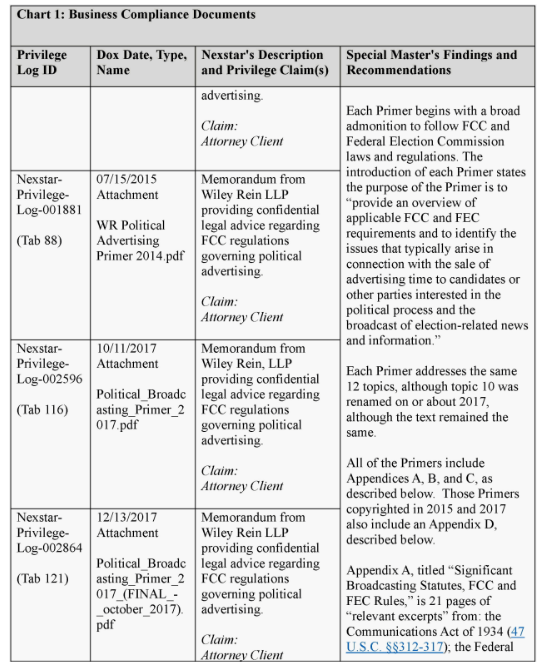




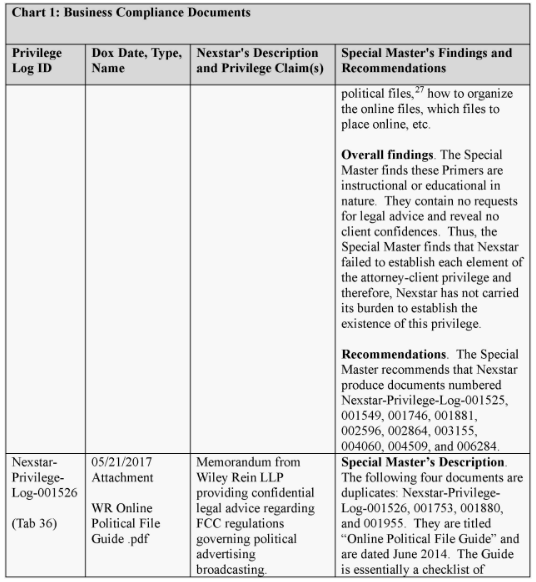









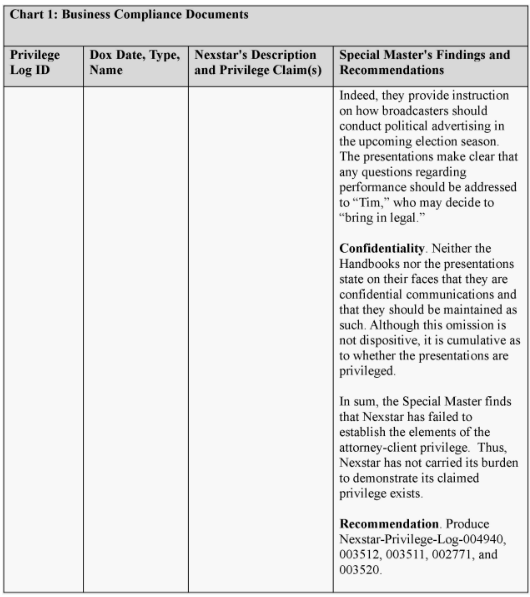
























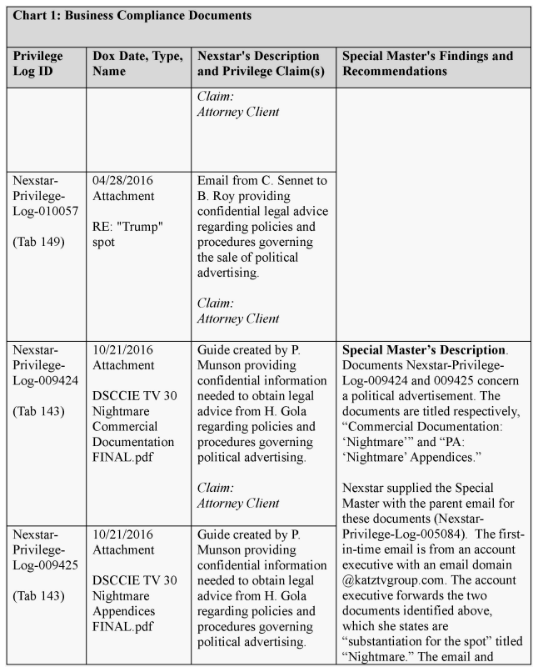

B. Corporate Policies
Before the Special Master in this section are 24 documents, which are characterized as “Corporate Policies.” The Special Master made detailed findings of fact and recommendations as to four Nexstar documents titled “Policy” or “Guidance” in R&R No. 1, Exhibit 1-Nexstar, which the Court “accepted in full.” In re Local TV Advert. Antitrust Litig., No. 18-06785, 2023 WL 5956851 (N.D. Ill. July 28, 2023) (Levie, Special Master), aff'd In re Local TV Advert. Antitrust Litig., No. 18 C 6785, 2024 WL 165207, at *1 (N.D. Ill. Jan. 16, 2024) (Kendall, J). There are a number of the documents Nexstar still contends are privileged even after R&R No. 1 and the Court ruling adopting R&R No. 1, although they share the same format, the same “Approver,” the same “Owner,” the same “Audience,” and all concern advertising policies as the already adjudicated Nexstar Policy and Guidance documents. Other Corporate Policy documents, although not sharing the same memo header, share the same trait components of (1) a brief overview of the advertising law and (2) the company's policies on when to accept certain advertising.
The Special Master adopts the rationale in R&R No. 1 (ECF 1030), Exhibit 1 for documents Nexstar-Privilege-Log-007577, 007583, 007588, and 007594 as controlling the disposition of the policy documents that remain in dispute.







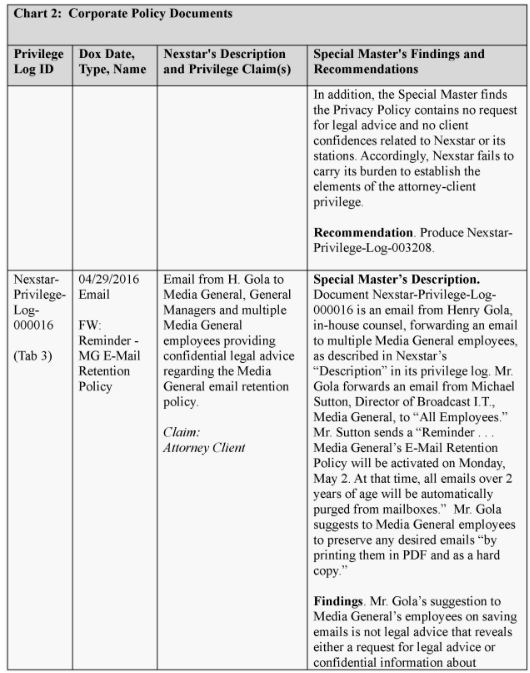






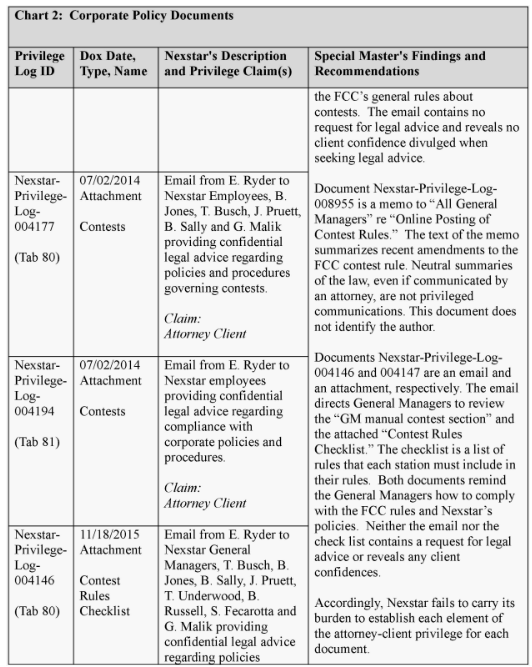


C. Broadcasters’ Political Advertising Disclosure Statements
*6 Since 1991, the FCC has required broadcasting stations to sell advertising time to political candidates at the “lowest unit charge” (“LUC”) during designated times before an election.[30] The Commission adopted this LUC rule to achieve parity between the rates and terms available to the station's “most favored” commercial advertiser and political candidates.[31] The FCC imposes on broadcasters an “affirmative duty to disclose to candidates detailed information about the rates and terms conditions and all value-enhancing discount privileges offered to commercial advertisers.”[32] The FCC has not created a standard disclosure form, pointing out the myriad advertising sales practices of broadcasting stations. The Commission, however, specifies the minimum information broadcasters must provide to political candidates.[33] As a result, stations’ disclosure statements are not uniformly titled nor do they contain identical content.
For present purposes it is important to recognize that the political disclosure statements exist to apprise third parties of a station's business practices in setting advertising rates.




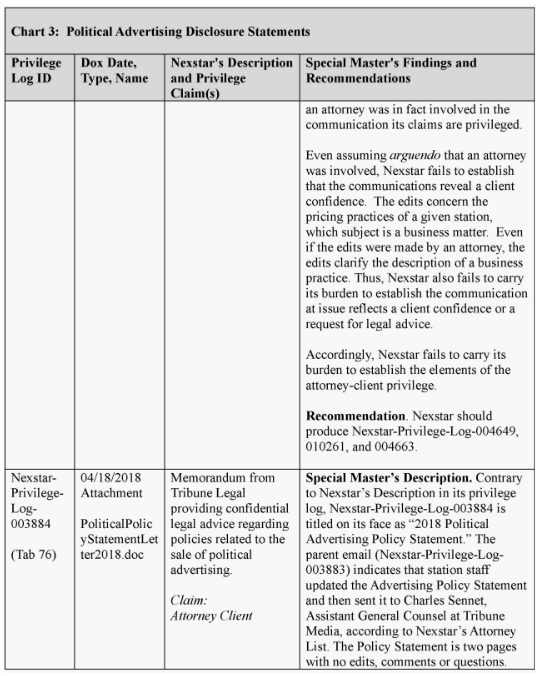













D. Documents from Third Parties
Despite Nexstar's assertion that the documents in this section are privileged attorney-client communications, most of the documents are letters or other communications written by third parties and sent to local TV stations. Many raise concerns about the veracity of political advertisements.[34]
All of these documents are designated “Attachments” in Nexstar's privilege log. Even assuming arguendo the parent email to these attachments were privileged, that privilege does not apply to the attachments. It is beyond cavil that attachments to emails are judged separately from their primary documents—to be withheld as privileged, each document must individually satisfy the privilege standard. See Local TV Advert., 2023 WL 5956851, at *11.[35] This document-by-document requirement is consistent with the foundational principle that the “privilege only protects disclosure of communications; it does not protect disclosure of the underlying facts by those who communicated with the attorney.”[36]
*7 Also troubling is that many of Nexstar's privilege log “Descriptions” of these documents not accurate. Upon in camera review, the Special Master finds numerous “Descriptions” contain names of people, including attorneys, that do not appear either on the face of the document or in the metadata of the pertinent log entry. In addition, in camera review reveals the “Descriptions” repeatedly, but erroneously, claim the document at issue “provides confidential information needed to obtain legal advice” without Nexstar submitting supporting extrinsic evidence or demonstrating where on the face of the document or its metadata there was support for the text of the “Description.”












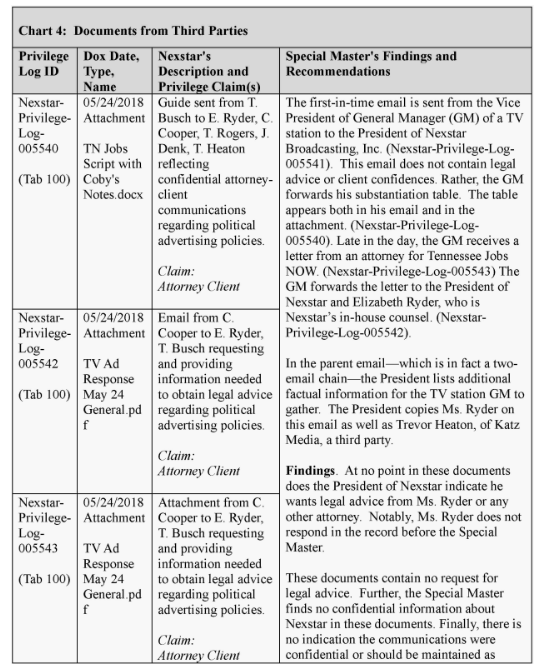




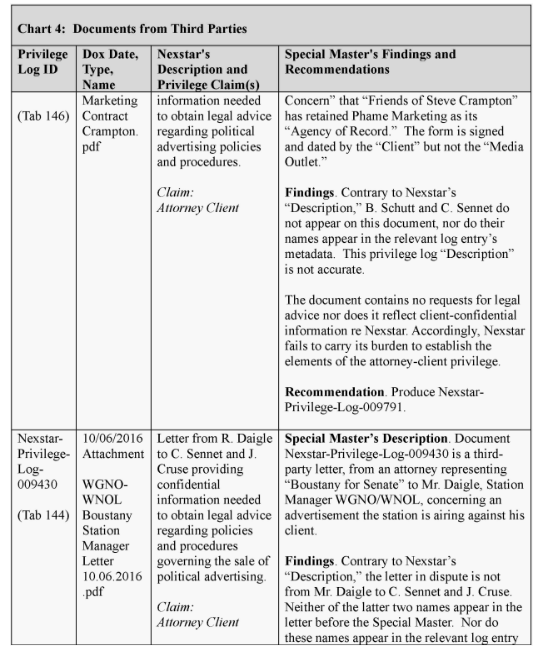






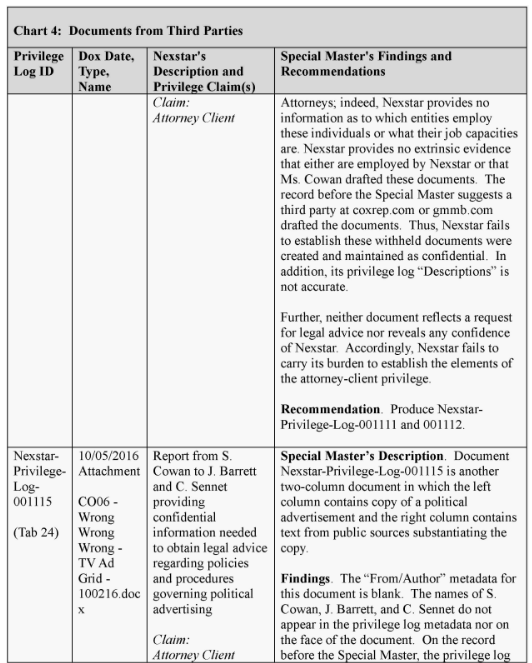

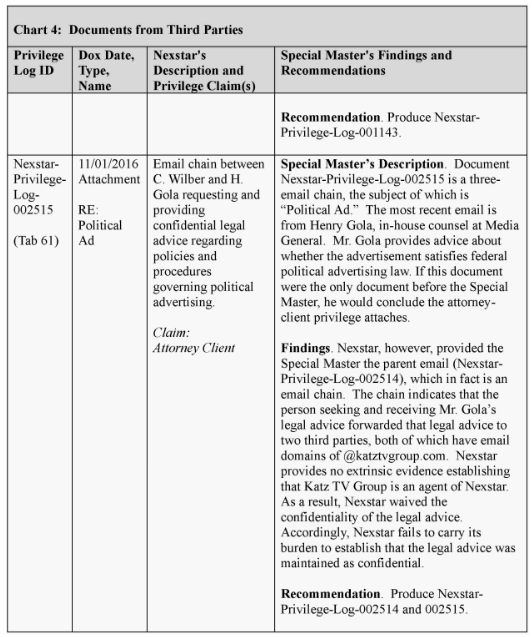

E. Miscellaneous Documents
Reading Nexstar's privilege log “Descriptions,” many of which read “legal advice regarding compliance with corporate policies and procedures,” one would expect these documents to fit under section A. Compliance Documents or section B. Corporate Policies. They do not, and thus are addressed here.
































Conclusion
Based on the foregoing, the Special Master recommends the Court grant in part and deny in part Plaintiffs’ Motion to Compel No. 9 (ECF 727) that now seeks production of 185 Nexstar's documents.
Footnotes
As to three of the documents, Nexstar also claims work product protection as a basis to withhold production.
Pls’ MTC No. 9 at 14-15 (ECF 727). In Plaintiffs’ MTC No. 5 (ECF 688), Plaintiffs challenged 124 Nexstar antitrust compliance documents for being improperly withheld.
Originally, Plaintiffs challenged 2,300+ compliance documents in their Motion to Compel No. 9 (ECF 727). At the Special Master's direction, Nexstar de-duplicated the 2,300+ documents to 373 documents. See Local TV Advert., 2023 WL 5956851, at *6. The Special Master determined that providing the parties guidance in R&R No. 1 on his interpretation and application of the applicable privilege law would be of more benefit to the parties and the case as opposed to completing the review of all of Nexstar's documents. In March 2024, the number of compliance documents in dispute to was reduced to 185.
The Special Master also flagged over 30 privilege log entries that, based on review of the actual documents, were inaccurate.
Local TV Advert., 2024 WL 165207, at *4.
Email, Feb. 12, 2024, Special Master Levie to Morrison & Foerster LLP, copy to: Hausfeld LLP and Zuckerman Spaeder LLP.
Email, Feb. 13, 2024, Morrison & Foerster LLP, to Special Master Levie, copy to: Hausfeld LLP and Zuckerman Spaeder LLP.
See Email, Hausfeld LLP to Special Master Levie, Feb. 22, 2024, copy to: Morrison & Foerster LLP and Zuckerman Spaeder LLP.
Email, Morrison & Foerster LLP to Special Master Levie, March 4, 2024, copy to: Hausfeld LLP and Zuckerman Spaeder LLP. In that email, Nexstar also stated that “Plaintiffs’ position is that since these parent emails are on Nexstar's privilege log and challenged by Plaintiffs in a different category, they do not oppose their submission now.”
Local TV Advert., 2024 WL 165207, at *5, quoting Urb. 8 Fox Lake Corp. v. Nationwide Affordable Hous. Fund 4, LLC, 334 F.R.D. 149, 158 (N.D. Ill. 2020) (collecting cases and quoting Am. Nat. Bank, 406 F.3d at 879).
Id., at *5, citing In re Sulfuric Acid Antitrust Litg., 432 F.R.D. 407, 431 (N.D. Ill. 2006) (Sulfuric Acid I).
Local TV Advert., 2024 WL 165207, at *4, citing Local TV Advert., 2023 WL 5956851, at *12 and Sulfuric Acid I, 235 F.R.D. at 431.
The Court summarized the Special Master's findings and recommendations in R&R No. 1 as based on: “(1) an in camera review of the 304 contested documents; (2) lists identifying attorneys who appear in Defendants’ privilege logs; (3) examination of Defendants’ privilege logs; (4) briefs submitted by the parties; and (5) declarations by litigation counsel authenticating emails and letters exchanged in the meet and confer process.” Id., at *1. The Court also noted that for his in camera, the Special Master had available “more than 750 pages of briefing, more than 2,000 pages of supporting declarations, exhibits, and other materials, and more than 190 judicial opinions concerning Defendants’ assertions of privilege.” Id., at *2.
Local TV Advert., 2024 WL 165207, at *4.
“Tab” refers to the location of the document in the two binders Nexstar submitted on March 6, 2024, to the Special Master for in camera review.
Sinclair withheld multiple duplicates of these Guidelines. See R&R No. 1, Exhibit 4, listing Sinclair's Doc. Nos. MDLSBGTV-024984, 025204, 025201, 025209, 25414, 025417, 025422,025438, 025470, and 025472.
The FCC requires broadcast stations to create and maintain political files online on a database hosted by the FCC. See 47 U.S.C. § 315(e)(1). The database and files are publicly available. See 47 C.F.R.§ 73.1943(b). The political file must include a complete record of every request to buy time for political advertising; the FCC enumerates the information the record must contain. Most of the information must be uploaded by the broadcasters. See 47 C.F.R. § 73.1943(a).
Nexstar also submitted the parent emails (Nexstar-Privilege-Log-000090 and 000092) to the Special Master; the Special Master notes that duplicate parent emails (Nexstar-Privilege-Log-007481 and 007483) were among the 185 disputed documents.
“Metadata” is defined in this case to be “structured information about ESI that is created by the file system or application, embedded in the Document and sometimes modified through ordinary business use. Metadata of the ESI describes, inter alia, the characteristics, origins, usage and validity of the ESL.” Stipulation and Order Regarding the Production of Documents and Electronically Stored Information (“ESI Order”), ¶2.16 (ECF 442).
See 47 U.S.C. § 315(b)(1)(A); see also 47 C.F.R. § 73.1942(a)(1)(i) (“A candidate shall be charged no more per unit than the station charges its most favored commercial advertisers for the same classes and amounts of time for the same periods. Any station practices offered to commercial advertisers that enhance the value of advertising spots must be disclosed and made available to candidates on equal terms.”)
See 47 C.F.R. § 73.1942(b). A 1990 audit of television and radio stations “revealed that political candidates often pay higher prices for airtime than commercial advertisers.” 7 F.C.C. Red No. 2, at 678-89 and 687 (1991).
N.B. Nexstar does not claim the Common Interest Exception to Third Party Waiver.
See also Towne Place Condo. Ass'n v. Philadelphia Indem. Ins. Co., 284 F. Supp. 3d 889, 895 (N.D. Ill. 2018) (“Merely communicating with a lawyer or copying a lawyer on an otherwise non-privileged communication, will not transform the non-privileged communication or attachment into a privileged one, even if the otherwise non-privileged communication was at the behest of the lawyer.”); Muro v. Target Corp., 2006 WL 3422181, 2006 WL 3422181, at *5 (N.D. Ill. Nov. 28, 2006) (“Attachments which do not, by their content, fall within the realm of the privilege cannot become privileged by merely attaching them to a privileged communication with the attorney.”); and Allendale Mut. Ins. Co. v. Bull Data Systems, Inc., 145 F.R.D. 84, 88 (N.D. Ill. 1992) (“for each separate document the following information: the date, the author and all recipients, along with their capacities, the subject matter of the document, the purpose for its production and a specific explanation of why the document is privileged.”).
Upjohn Co. v. United States, 449 U.S. 383, 395 (1981). See also Fisher v. US, 425 US 391, 403-404 (1976) (“This Court and the lower courts have thus uniformly held that pre-existing documents which could have been obtained by court process from the client when he was in possession may also be obtained from the attorney by similar process following transfer by the client in order to obtain more informed legal advice.... Thus, even absent the attorney-client privilege, clients will not be discouraged from disclosing the documents to the attorney, and their ability to obtain informed legal advice will remain unfettered.”) (internal citations omitted).